'A robust electoral democracy provides an institutional basis for the generation and regeneration of political hope.'
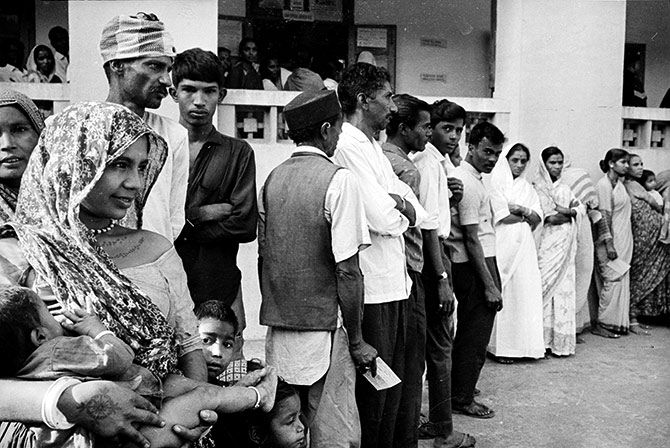
"It doesn't matter what your political leanings are, but the fact is that people can make a choice and governments have to be accountable to them."
"This strong institutional basis for generating and regenerating political hope is not meant to be taken for granted."
Ornit Shani drew applause from the audience while she described the amazing story of the making of India's first voters list.
The Israeli academic spoke about the forgotten bureaucrats who drew up the first electoral rolls, the crucial exercise of making every vote equal and how those first electoral rolls laid the plinth of Indian democracy.
Ornit Shani discussed her fascinating book How India Became Democratic (Penguin) at the Times Lit Fest last month with journalist Vikram Doctor, whose grandfather Ambassador A V Padmanabhan was among the civil servants who worked on that historic enterprise -- India's first electoral rolls.
Rediff.com's Archana Masih listened in.
The first voters list was the plinth of democracy
If you do not prepare an accurate electoral roll, as humanly possible, the very first time, it is very difficult to put in place the electoral process.
This list of first voters is the plinth over which rests the institution of electoral democracy.
This is the basis for voters to build trust in the system. The failure of democracy in some countries had something to do with this.
See what happened to the franchise in Pakistan. It can tell you something about the failure of democracy there.
The constituent assembly of Pakistan could not decide for years what would be the form of franchise.
They had a system initially of separate electorates for west Pakistan and joint electorate for the east. Ultimately, if you don't decide the structure of the franchise, you cannot make electoral rolls.
India's Election Commission is a very dynamic institution and that is what came out in the processing of the first roll.
The first Election Commissioner of India, Sukumar Sen, after completing the first election in India, went to do the election in Sudan in 1953-1954.
Why democracy should not be taken for granted
Having an electoral democracy does not secure democracy.
You cannot have equality and ideals of the implementation of the will of the people, without a robust democracy.
A robust electoral democracy provides an institutional basis for the generation and regeneration of political hope.
It provides for you the means to choose a better government.
It doesn't matter what your political leanings could be, but the fact is that people can make a choice and that governments have to be accountable to the people.
A strong institutional basis for generating and regenerating political hope is not meant to be taken for granted.
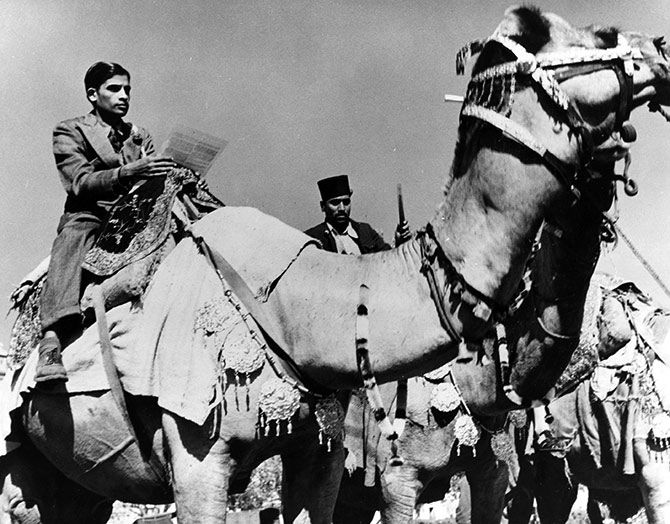
The story behind the first voters list
The Indian Election Commission is strong, independent and autonomous and is directly linked to the story (of the first voters list) I am telling.
The original provisions in the Draft Constitution of 1948 suggested that every state of the Union would have its own Election Commission.
During the 9, 10 months of the preparation of the draft rolls, the bureaucrats of the secretariat of the Constituent Assembly realised that it would be a bad idea.
The reason they thought this was because when they were preparing the lists there were many attempts at disenfranchisement of people on the ground and infringement of the instructions.
On the ground, of course, there were officials that were trying disenfranchise many because they thought that some people did not have the right to vote. Why would they register Dalits in a village?
They realised that unless there is a central and autonomous Election Commission people could be disenfranchised at the whim of a district officer.
So bureaucrats of the secretariat wrote a note to the central committee explaining why there should be a central, autonomous commission.
The Election Commission heroes who made the first electoral roll
The whole process of the preparation of rolls was not just the management of the preparation. It was four months of dialogues, deliberations on devising instructions on how to prepare the rolls on the basis of universal adult franchise as an all India project.
It was done by a branch of the secretariat of the Constituent Assembly of India.
It was a small interim body guided by the Constitutional Advisor to the Constituent Assembly B N Rau (Sir Benegal Narsing Rao).
This branch comprised of very few people -- Joint Secretary S N Mukherjee, Under Secretary A V Padmanabhan, two researchers (A A Abidi and Brij Bhushan), and Under Secretary (P S Subramanian).
This group was highly competent, had admirable integrity and was very responsive to the people.
On receiving complaints that attempts were made to disenfranchise people, the bureaucrats started making the public aware. They published the instructions in different languages in the form of a story to help people engage with them.
They were very responsive to the complaints, responsive to the level that they would bring to account local administrators.
Their task was to operationalise the principal of procedural equality. To make every man and woman equal voters.
They took their work seriously and did everything in their capacity.
When you read their files they are not about what it means to the nation, freedom and democracy -- for them it was a bureaucratic test that had to be performed properly.
Sometimes, local governments interpreted the instructions in a wrong way. It is a result of these ongoing instructions that that they were able to mentor administrators across the country.
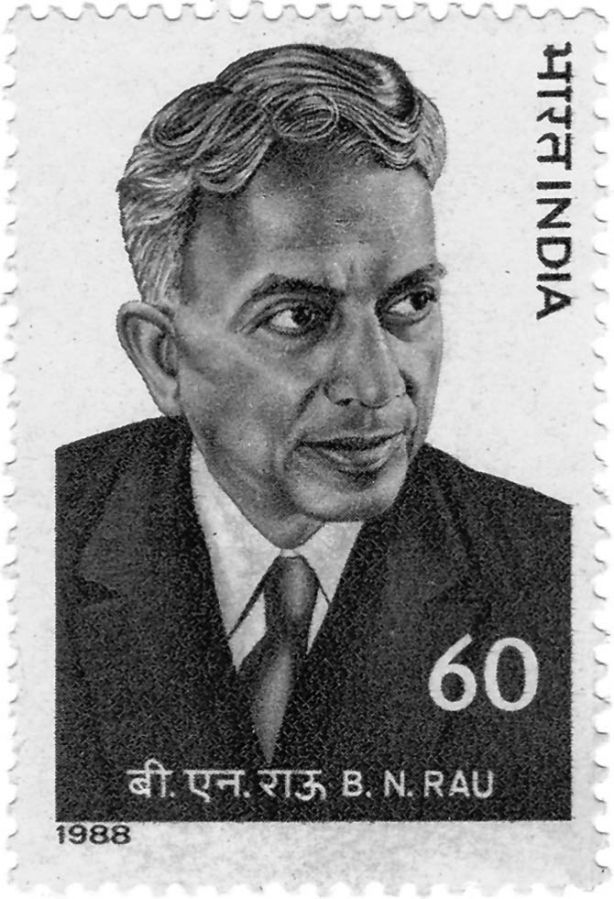
Indians became voters first and citizens later
While the Constituent Assembly was still debating the Constitution in Parliament, there were Indians with a strong sense of being Indian and of their rights which were technically not yet rights (because the Constitution had still not come into force).
These people wrote to the bureaucrats of their complaints and these bureaucrats wrote back.
Imagine being an ordinary person in an Assam village getting a letter from the Constituent Assembly secretariat. Effectively, people had no degree of separation from the secretariat of the Constituent Assembly.
They not only did acknowledge the letter, but even wrote another letter explaining what they did about their problem.
The most overwhelming experiences for me while researching was to read the letters of people.
How ordinary Indians made a place for themselves in the new universe of universal franchise
Many letters were from Assam and many from refugees writing about disenfranchisement.
People understood that a place on the electoral rolls really could secure their place in the state for them.
At that time who is an Indian was one of the most contested questions because there was no citizenship law, no Constitution, only citizenship provisions.
In order to be a voter you needed to be a citizen and have a place of stay for 180 days where you register. But who was a citizen was not too clear especially with regard to refugees who did not have 180 days.
There were special provisions to include them by the mere declaration that they are committed to stay and reside where they were being registered.
Disenfranchisement was often not deliberate, but because of misunderstanding instructions.
People interpreted the Draft Constitution and started using the language of the Draft Constitution. Dr (B R) Ambedkar, while presenting the revised draft to the Constituent Assembly, said we were trying to implement a democratic Constitution on undemocractic soil.
But on the other side, these letters show how people began to think about this new polity of universal franchise. What it meant to them and how they made a place for themselves in this new universe of universal franchise.
'No difference in choosing a mate or choosing a legislator!'
Many wrote letters about the age and caste of voters. A fantastic letter from Poona says that the age 21 set for voters had no psychological logic.
'I think it should be 21 for women and 25 for men because this is considered to be the right age of marriage and ultimately there is no difference in choosing a mate or choosing a legislator!'
There are dozens of letters with inventive creative ideas!
The most overwhelming thing was how people drove the process of the first roll and how the decision on refugees was taken about those who had lost all.
How refugees who did not have a residence were enrolled
The basic criteria was being 21, a citizen and resident -- refugees did not need the criteria of citizenship and residence.
The secretariat started getting letters from bureaucrats around the country about how to register refugees without residence qualification.
The secretariat tried to find a solution over three months. They look into international precedents -- like what happened after the partition of the Ottoman empire, what happened to refugees in the wake of Wolrd War I -- but they could not get any leads and had to find their own procedures.
These were preliminary rolls and they decided to enroll the refugees on the mere declaration that they would reside in India without the distinction whether that is a good or a bad refugee.
One has to look at what they have done to think about today. It was the most courageous thing they did at the time.
When the rolls were ready, some politicians started to doubt whether the right to vote should be given to illiterate people -- whether the literate and illiterate should be on the same footing -- but it was too late.


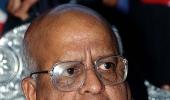







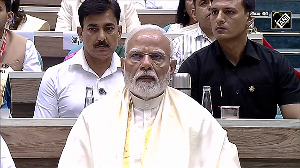
 © 2025
© 2025